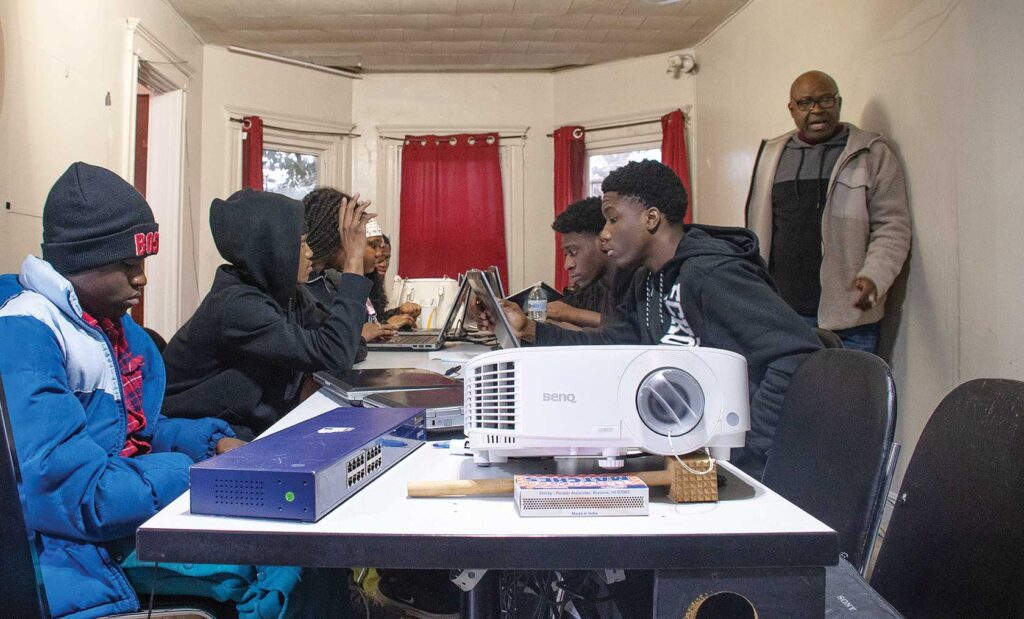
The class operates out of half a Mattapan duplex, in a long narrow space that could have been a dining room in a past life. Now the table stretching the length is lined with chunky laptops, where local students consume computer science and information technology skills.
The Get Paid to Learn IT Job Training Program at the Mattapan/Greater Boston Technology Learning Center trains students while paying them $16.25 per hour. Staff at the tech center hope the course will help bridge skills gaps that exist for communities of color in tech industries.
“We feel like we belong everywhere. The only thing that stops the young Black people from getting those big jobs in the technology industry is they don’t have the skills,” said Jacques Dady Jean, the center’s program development officer.
Students in the program said that the coursework is helping them take steps toward life goals like entering computer engineering and software fields or continuing to higher education.
Justice Fleurival, a ninth grader from Mattapan, wants to attend MIT and said the class is an important step on that path.
“I always wanted to know [about computers],” Fleurival said. “I feel like this program is an outlet to learn all this stuff.”
The tech center, which serves about 50 students during the school year and 60 over the summer months, may have an opportunity to expand with a youth development grant from the city of Boston.
Jean said the center requested $250,000 in funding from the city and received notification of approval but without confirmation of how much of that will come through. Nevertheless, he said it was an important step in bringing resources to Mattapan.
“This type of funding never comes to our community,” he said.
He hopes the money will support training in networks and cyber security skills that will help participants be competitive in the computer science workforce.
Jean said it could allow the tech center to upgrade equipment to allow students to work with more up-to-date technology, support the creation of a robotics program to serve younger students and allow the tech center to bring on more students.
In a city with one of the most dynamic tech industry clusters on the planet, grassroots training programs like those at the Mattapan center are doing their best to close the skills gap. Jean is determined to expand the center’s efforts in spite of little industry support, with much of its outside funding currently coming from foundations and corporate sponsors.
Jean said the recently approved grant money, whatever the amount, will mark the first time the city has supported school-year programming. The city gave $66,000 for its summer program in 2023. The center has received state funding as well as grants from other groups like State Street Foundation.
The program has also been an employer through the city’s SuccessLink summer youth jobs program.
The Mattapan/Greater Boston Technology Learning Center’s work aims to fill longstanding gaps in diversity and equity in computer science fields. According to Zippia, a job information website, in 2021 about 64% of the computer science workforce in the United States is white, a trend that’s been gradually declining — ten years ago about three quarters of the workforce was white. Black computer scientists make up about 4% of the workforce.
There’s also a disparity in gender representation. In 2021, almost 80% of the workforce was male, according to Zippia.
The absence of people of color in the field presents a currently missed opportunity to close wealth gaps, said Ed Lambert, executive director of the Massachusetts Business Alliance for Education.
“We can’t have an equitable commonwealth if positions in technology and computer science don’t reflect the demographics of the population,” he said.
Jean said more training opportunities are needed to close those gaps.
In schools, Lambert said that there should be more computer science courses, especially starting young to help encourage interest in the field, but that outside groups like Mattapan/Greater Boston Tech Center have a large role in addressing capacity issues in schools.
The landscape for tech education in the state has room for growth. Nearly a quarter of Massachusetts high schools don’t offer a foundational computer science class, according to Code.org, a computer science advocacy and education nonprofit.
A 2023 report from the MBAE found that urban schools, which are more likely to serve students of color, were less likely to offer a computer science course; 71% of urban schools offered the courses compared to about 80% in suburban and rural ones.
For students who do take computer science classes, representation isn’t equitable. According to the MBAE report, Black students in Massachusetts schools that offer computer science coursework make up 11% of the student body, but only 9% of those enrolled in the tech classes. For Latino students, the gap is bigger, making up 21% of students but only 15% of computer science enrollees.
Language barriers, too, present challenges for computer science education. The report found that English language learners made up 3% of computer science enrollees in Massachusetts high schools while making up 11% of the student body.
Lambert said tech education offers an opportunity to bring together students from different language backgrounds.
“Computer science has a language all its own that has the capacity to transcend one spoken language,” he said. “We think that makes it an excellent choice for subject area that can bring a variety of different language speakers together.”
The students attending the Mattapan/Greater Boston Tech Center represent steps taken to address that language gulf. Jean said last summer the program welcomed students from 17 different backgrounds.
“We have children in our program that speak Swahili. We have children that speak French. We have children that speak Haitian Creole. So we need to have a lab that can meet the needs of those students,” Jean said. “We don’t want to leave anyone behind.”







